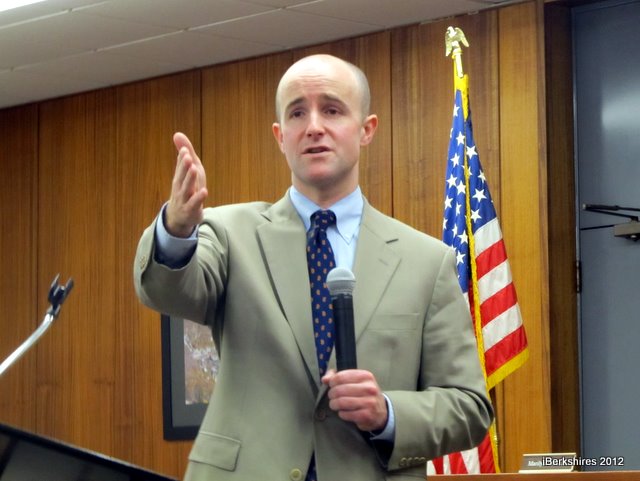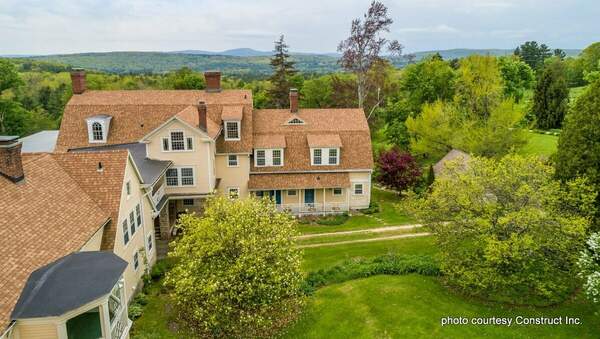Legislative Q&A: State Sen. Benjamin Downing
 Sen. Benjamin B. Downing, pictured at a public meeting at North Adams City Hall earlier this year, pointed to the state's storm response bill and health-care cost containment among legislative successes this past year. |
The three-term senator earned leading roles — from chairman of both the Telecommunications, Utilities and Energy and the Steering and Policy committees to a seat on the Ways and Means Committee — where he says he has made an impact for his district, which encompasses all of the Berkshires and parts of Franklin and Hampshire counties.
Downing, a Democrat, faces no opposition as he runs in November for a fourth term.
Some of the highlights of the last year the Pittsfield resident points to include increasing the use of green energy, overhauling health care and increasing the number of historic tax credits. iBerkshires sat down with Downing recently to get his take on the various bills and what his constituents can expect in the next session.
Q: What were the highlights of the Legislative session?
BD: I think the big ones from my perspective were obviously health-care cost containment. I think that was a priority both in the delegation and among the various leader — the administration and the Legislature. Going back over the past few years, I could tell you that I could absolutely tell based on the amount of people who would talk to me about the issue, when renewals would come out from their insurance companies. I didn't need to look at a calendar, I knew when they were coming out based on people's reactions. What we did was put in place a framework to hopefully bend that cost curve and continue to meet our goals of insuring everyone. I think health-care cost containment is clearly a big win for everyone this session.
The energy bill we did keeps an eye toward continuing our progress in clean energy and energy efficiency but also keeps an eye on costs and reducing costs where we can.
Finally, our storm response bill, which was an update to our storm response laws. That was something I worked on a lot. That was something when I do my monthly "coffee and conversations," I hear a lot of frustration from local officials and individuals about the lack of expedited and planned out response to our storms by the utility companies. This starts to get at those communication and other issues. It's a challenge I think we're going to see more and more of with more extreme weather events. It's a national challenge but I think the particular challenge we have is that much like our transportation infrastructure, much like our buildings and housing stock, our electrical infrastructure is a lot older than in other parts of the country. We have to be smarter about how we prepare to replace it in case of a large storm.
Q: What exactly does that bill do?
BD: The highlights are first that the utility companies have to file, as of today, their emergency response plan — their ERP — with the Department of Public Utilities. They also have to file that plan with every community that is in their service territory. One of the major things that we heard from constituents, from emergency management officials and our cities and towns was a lack of communication between the utility companies and the emergency officials, who citizens are going to asking why isn't my power turned back on or what is the plan for turning it back on. Requiring the plan to be filed allows emergency management officials to look at it and say what they like about it, what they don't, how to improve it and also how they can coordinate their plans with it.
Also within that bill, the utility companies, if they are fined under our current storm response laws, that fine will go directly back to rate payers. Under the current law it would just default back to the general fund. So we thought it made sense that if ratepayers are the ones who are going without power that they receive any financial windfall that there is in the case of fines. The attorney general has recommended fines recently on both National Grid and NStar.
We require the utilities within a 24-hour period of assessment to provide all of their customers with a timetable for restoration of power and then to continue to do so at least once every 24 hours until their power is completely restored. Again, it is something to help people plan. What we heard was that lack of communication, that lack of knowledge didn't allow small businesses to determine if they have to liquidate their inventory if they are a restaurant, if you are a middle-class family determining what of your food you can or cannot eat if you are going to go without power. I think people recognize, especially in an extreme and large storm, there are going to be times when you are without power. But they just want to have the information to make that as painless as possible.
Q: Let's talk about the energy bill. What exactly does it do and what happened with the wind siting?
BD: The easiest part of that is the wind siting, which we put into a study order. The committee felt that at this time there was a lot of disagreement about any way to change the siting process, how to develop siting standards and we wanted to focus our time and efforts on the storm response legislation and then a larger update to our Green Communities Act, which is what the energy bill ended up being.
The two themes of the energy bill were continued smart investment in clean energy and then trying to keep an eye on costs through a more predictable rate-setting process for our utility companies. To start with the latter, when you go back to the electric rate shock we really felt in the first part of calendar year 2007, that was largely Western Mass Electric Co. and National Grid to a lesser extent. That was largely a byproduct of the utility company not having come in for a full rate-setting process in more than a decade. What we said is that there has to be a more regular process for that — either for rate cases or settlements — to have them come in more often so that if there is going to be an increase in rates, the business community can have their say about the request that the utility company is making. Hopefully that will give us a more predictable process.
On the clean energy side, our focus was on programs that help directly residences and small business. In particularly the net-metering program. Right now, Pittsfield and Lenox are part of a program that the Clean Energy Center is running that is called Solarize Massachusetts. What that does is bundle a lot of small projects together to try and make it more attractive to developers to do residential installation for solar. That program wouldn't be possible if we didn't increase our net-metering caps. Net-metering basically says that if this building were to put a solar array on their rooftop, anytime they aren't using the energy they are generating, the excess power would have to be bought by the utility company at a fixed rate. What that does is it gives a revenue stream for a project and makes the finances for that project a lot more attractive. Without that, we'd end up with only these large scale utility projects and not the smaller projects that we all want to promote and support for a lot of reasons.
We also say that when it comes to a long-term contract, those contracts have to be bid. We felt that when long-term contracts are bid, it was a win all around. Ratepayers won because they got the best bang for their buck, the environment won because we continued to put forward clean energy and clean energy developers had the certainty of a longer project. They may not get the best rate that they would have got but they get it for over 15 to 20 years and that allows them to better finance a project.
Q: What pieces of legislation will most affect your constituents?
BD: There are a couple of different ones that I will point out. There was a piece of jobs legislation that we passed and in that I was the author of an amendment that increased the number of historic tax credits that are made available here in Massachusetts so that we have historic buildings for housing and for commercial and in some cases industrial spaces.
The historic tax credit program is the reason that we have the Beacon Cinema in Pittsfield. The historic tax credit programs were used in the Colonial Theater, the Mahaiwe in Great Barrington. Historic tax credits have been part of some of the proposals for the Mohawk Theater and others we talk about moving forward. That was something that I advocated for because it was something we've seen the fruits of here and is also something that disproportionately will help communities like Pittsfield and North Adams because we generally have older buildings in our downtowns and we have buildings that have gone undeveloped because the real estate market isn't as hot as it is in Boston.
Something the entire delegation worked on that was signed into law late this session was legislation that the mental health and substance abuse committee put forth — Rep. Paul Mark was a real champion for — was requiring doctors to enroll in the prescription monitoring program. This was something that came up when Secretary [of Public Safety Mary] Heffernan was out here and we had that crime round table. Folks talked a lot about the issues around prescription medication.
We've done a lot already. The district attorney along with Berkshire Health Systems and Northern Berkshire Healthcare in trying to raise awareness around these issues. But despite everything we've done, only 30 percent of doctors were enrolled in the prescription monitoring program.
I think 99.9 percent of doctors are doing the right thing when it comes to how they prescribe medication but that one-tenth of 1 percent is doing a lot of harm and we need to be able to look for different patterns. We need to be able to help doctors know when patients are doctor shopping just trying to find a prescription to fill an addiction. More people have died in Massachusetts, residents of Massachusetts, our friends, our neighbors, have died from prescription overdoses from opioids since the start of the Iraq war, than we've lost soldiers in Iraq. I think this is a small part of our multipronged effort to address that. But everywhere I go, that issue comes up and someone in the audience or someone in the crowd has been impacted by addiction to prescription medication.
Q: You said "multi-pronged." What are the other prongs?
BD: Making sure we have the beds available for treatment for individuals, it is working with other states because you can't just look at Massachusetts. People can buy meds across state lines and bring them in. It is doing things like the district attorney and the health systems have in trying to raise awareness throughout the community and support programs that will help battle addictions.
Q: Were there any pieces of legislation that you wanted to see move forward but did not or pieces that did move forward that you were against?
BD: The legislation that I'd have liked to see move that didn't move, I would have liked to see the bottle bill pass. I disagreed with my co-chair ultimately on where we came down on that. It passed the Senate in two different forms but ultimately didn't get the final votes it needed. I'd like to see the bottle bill passed.
I have legislation that would require public school coaches to have CPR training. I think when you look at some stories that we've seen in the press in the last few years about kids who have undetected heart disease and had heart failure in the middle of practices or in the middle of games. Oftentimes, there isn't someone there who is trained in CPR and if you have someone administering CPR right away all of the statistics show that you have a lot better chance of saving that kid's life. That passed the Senate but it didn't make it through the other bodies. Hopefully, we'll get that through.
I also have a piece of legislation around lakes and ponds regarding zebra mussels and defining invasive species that got almost every vote it needed but it didn't get over the last hurdle so I am hoping to get that passed in the next session. We might have to expand that to deal with the issue we have most recently in Dalton with the emerald ash borer.
Q: Can you talk about your committee work?
BD: I am on more committees than I care to admit. I am chair of the Telecommunications, Utilities and Energy. I am also chair of Steering and Policy. I am vice chair of Arts, Tourism and Cultural Development. I am on Senate Ways and Means and I am an active member of the Higher Education Committee. I am honestly on another four committees.
In the telecom, utilities and energy, our focus in this session was on the storm response legislation and the clean energy and energy cost bill. I think those are both important updates to existing laws that we have on the books.
In my chair of Steering and Policy, that is basically making recommendations to the Senate president about what matters to deal with and when and giving her feedback when she has scheduling ideas on when we will bring up things.
Arts, Tourism and Cultural Development really was last year more about advocacy in the budget. I was working in tandem with Rep. William "Smitty" Pignatelli in the Cultural Caucus and really worked to make sure we had funding for our regional tourism councils and the Berkshire Visitors Bureau. We know investing in tourism here in the Berkshires means jobs, it means revenue for our cities and towns.
Ways and Means is all budget, all of the time. In higher ed, we have a lot more work to be done. Although it wasn't necessary a bill that was won or lost on, I am continually frustrated with what I think is the under investment in public higher education. That has been my budget priority in the last few years and I haven't been able to make it an overall priority of the entire Legislature. I am going to continue to fight for it because I think we've been good at investing in the brick and mortar of public higher ed but we haven't been good in investing in the overall system. The cost of going to school continues to rise and more and more people look at public higher ed and realize what a great deal it is. When you look at the region that I represent, public higher ed means jobs. In the Northern Berkshires MCLA is a critical part of the community and BCC is sort of that first step into higher ed for a lot of people. We need to do better there.
Q: What are your priorities in the next session?
BD: From the committee perspective, the Telecom, Utilities and Energy Committee, I really want to focus and have been discussing with the Mass Broadband Institute, what next steps we need to take to continue our efforts to make sure everyone in every community has access to high speed internet. That project is ongoing right now and we are building the middle-mile of network but I want to make sure we are doing everything we need to to make sure that last-mile connection is there so we don't build a great highway with no off ramps. That's something I am working on now and there may be a legislative fix or there may not be.
On the energy front, I'd like to dig down more into our energy efficiency programs because we invest a great deal of money there and we have some of the best programs in the county. But I've heard from constituents that are frustrated with their ability to access those programs. I'd like to see what we can do to improve that.
Noncommittee-related, I want to continue to build support for investment in public higher education. Just from a district perspective, whenever you talk about the economy and jobs here in the Berkshires, you are talking about MCLA and BCC. They are involved in everything, they are the center of everything. The Center for Science and Innovation [being built at MCLA] and all the good work BCC has done for energy efficiency and the partnerships they've formed through the compact, we need to give these institutions the resources they need to do all the good work.
Q: Can you talk about the budget process. What were some of the big wins and loses?
BD: Personal wins that I advocate for were regional school transportation. We were able to increase the level of funding by about $2 million. We still have a long way to go but I was proud to be the lead sponsor in the Senate on that amendment. We were able to increase slightly the emergency food assistance program, which is important to our food banks and our shelters. We were able to continue to support the community coalition with funding in our model coalition. Those were some of the big wins for me.
Tags: Ben Downing, legislators, Legislature, Q&A,















